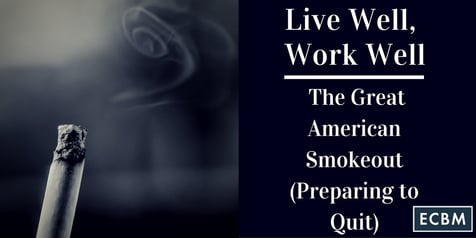Smoking: Preparing to Quit

Just thinking about quitting may make you anxious, but your chances will be better if you get ready first. Quitting works best when you're prepared.
Set a Date
Pick a date within the next two weeks to quit. That gives you enough time to get ready, but not so long that you will lose your motivation to quit. Think about choosing a special day, such as your birthday or the Great American Smokeout Day. If you smoke at work, quit on the weekend or during a day off.
Share Your Plans
Quitting is easier with the support of others, such as family, friends and co-workers. Tell them how they can help you. For example:
- Let them know that your mood may change. Remind them it won't last long. Explain to them that the longer you go without cigarettes, the sooner you’ll be your old self.
- If someone close to you smokes, ask them to quit with you, or at least not smoke around you.
- Seek support from others. Try talking with others one-on-one or in a group setting. The more support you get, the better.
Anticipate and Plan for Challenges
Expecting challenges is an important part of preparing to quit. The first few months will be difficult, as you may be more tempted to light up when you are stressed or upset. It can be challenging to prepare for these moments before they occur, but it can help if you are familiar with what triggers your urge to smoke and plan how you will resist these urges. Remember that you will experience withdrawal symptoms as a result of giving up nicotine. This is normal and will pass with time.
Discuss Your Plan with Your Doctor
Quitting cold turkey isn't your only choice. Talk to your doctor about other options. Your doctor, dentist or pharmacist can also direct you to other sources of support.
If you are on any prescription medications, tell your doctor and pharmacist you are quitting smoking. Nicotine changes how some drugs work.
Withdrawal Medications
Nicotine replacement therapy (NRT) may help your withdrawal symptoms. Nicotine gum, patches, inhalers, sprays and lozenges are all types of NRT that replace the nicotine you are no longer getting from cigarettes –but make sure you talk to your doctor and pharmacist before trying any of them. Some will require prescriptions, while others are over-the-counter.
Benefits of a Quitting Program
You may want to try a smoking cessation program or support group to help you quit. They help smokers spot and cope with problems they experience when trying to quit. A smoking cessation program can help you quit for good by:
- Helping you better understand why you smoke
- Teaching you how to handle withdrawal and stress
- Teaching you tips to help resist the urge to smoke.
Did You Know...?
Despite the fact that nicotine is very addicting, millions of people have quit smoking. You can succeed, even if it takes many tries. Nearly half of the people in the United States who ever smoked have now quit.
This post is for informational purposes only and is not intended as medical advice. For further information, please consult a medical professional.
© 2007-2009, 2011 Zywave, Inc. All rights reserved.
